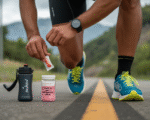The Science of Caffeine and Hydration for Runners
Many runners rely on a pre-run coffee kick to boost energy and focus. But does that morning cup sabotage your **hydration**? It’s a common question, often surrounded by persistent myths. To truly understand caffeine’s impact on fluid balance for active individuals, we need to examine the scientific evidence.
There’s a long-standing belief that caffeine is a potent **diuretic**, significantly increasing urine production and thus leading to water loss. While it’s true that caffeine *can* have a short-term diuretic effect, this effect is often **overstated**, particularly for individuals who consume caffeine regularly and in **moderate amounts**. The body typically builds tolerance to this specific effect over time with habitual consumption.
Crucially, extensive **studies** have investigated caffeine’s impact on overall **hydration status**. Research published in reputable scientific journals, including comprehensive reviews, consistently shows that **moderate daily caffeine intake** (generally up to 400mg for adults, equivalent to roughly 1-4 cups of coffee depending on the brew) does *not* lead to clinical **dehydration** in regular consumers. For most people who drink coffee regularly, caffeinated beverages contribute to their daily fluid intake much like plain water does. Summaries of this research are available in publications such as the Journal of Human Nutrition and Dietetics.
This scientific consensus effectively **debunks the myth** that coffee is inherently dehydrating. The notion that you need to drink an extra glass of water for every cup of coffee isn’t supported by current scientific evidence, *provided* your total daily fluid intake is adequate and your coffee consumption remains within recommended **moderate limits**. For runners, this is reassuring – it means you can likely enjoy your pre-run boost without worrying about it negatively impacting your fluid levels on a normal training day, assuming you maintain adequate overall hydration.
Ultimately, maintaining consistent **hydration** throughout the entire day is far more critical for runners than focusing solely on the minimal diuretic effect of a single pre-run coffee. Understanding this science allows you to make informed choices about incorporating caffeine into your routine without compromising the fluid status essential for optimal performance.
How Caffeine Impacts Fluid Balance During Runs
It’s a common query among runners: how does that pre-run coffee truly affect your hydration mid-stride? While caffeine is known to have a mild diuretic effect at rest, its influence on your **fluid balance** while you’re actively running presents a different scenario. Grasping these distinctions is vital for optimizing performance without sacrificing hydration.
During moderate to intense exercise, your body naturally prioritizes blood flow to working muscles, diverting it away from non-essential functions like urine production in the kidneys. This physiological shift significantly reduces the rate at which urine is formed. Consequently, any mild **diuretic effect** caffeine might possess is largely suppressed while you are engaged in physical activity. The primary mechanism for fluid loss during a run isn’t increased urination, but overwhelmingly through **sweat**.
However, **individual tolerance** to caffeine varies considerably. Some runners may exhibit higher sensitivity, potentially experiencing effects like a slightly increased urge to urinate (even if actual output is minimal) or mild gut discomfort. Regular caffeine consumers typically develop a greater tolerance, which can further diminish any diuretic impact. Paying close attention to your own body’s unique response is always the most reliable approach.
Caffeine can also have a slight **thermogenic** effect, subtly increasing your body temperature and **metabolism**. This *could* theoretically lead to a marginal increase in **sweat rate**. However, similar to the urinary effect during exercise, this contribution is usually minor when compared to the substantial sweat loss driven by exercise intensity, environmental temperature, and humidity. The critical focus remains on effectively replacing the significant fluids lost through sweat, which is the dominant factor governing hydration status during your run.
To summarize caffeine’s interaction with fluid balance while running:
- Exercise decreases blood flow to the kidneys, reducing urine production during physical activity.
- Any mild diuretic effect of caffeine is often mitigated or suppressed while exercising.
- **Individual tolerance** to caffeine significantly influences how you react.
- **Sweat loss** is the principal fluid challenge during a run, far outweighing caffeine’s minor potential effects.
Understanding these points helps shift the focus from undue concern about caffeine-induced dehydration *during* the run to prioritizing comprehensive **hydration strategies** designed to manage your primary fluid loss mechanism: sweat. You can find more information on the body’s fluid regulation during exercise from reputable sources like the Cleveland Clinic.
For a visual explanation of how caffeine affects runners, check out this video:
Timing Your Pre-Run Coffee for Peak Performance
Strategically timing your pre-run coffee can significantly enhance your performance and overall comfort during your run. It’s not merely a question of *if* you drink coffee, but *when* you consume it to optimally leverage its benefits without encountering unwelcome complications. Understanding how your body processes caffeine is the fundamental first step.
The generally accepted **optimal window** for consuming your pre-run caffeine is **30 to 60 minutes before you begin your run**. Why this specific timeframe? Upon ingestion, caffeine is rapidly absorbed into the bloodstream, primarily through the stomach and small intestine. It takes approximately 30 to 60 minutes for blood caffeine levels to reach their peak concentration. This peak level correlates with when you are most likely to experience the desired effects: heightened alertness, increased focus, and a reduced perception of fatigue or effort. Aligning this window with your starting time ensures these performance-enhancing benefits are active when you need them most.
Conversely, **avoiding late intake** is crucial for mitigating potential **mid-run digestive issues** and the sudden need for bathroom breaks. Drinking coffee too close to your start time – for example, within 15 or 20 minutes – does not allow your body sufficient time to process the liquid and caffeine before introducing the physical demands of running. This can predictably lead to stomach upset, bloating, or inconvenient urges. Allow your system adequate time to absorb and settle before subjecting it to physical stress.
A practical strategy many runners employ is to **sync their coffee timing with their pre-run warm-up routine**. If your typical warm-up takes 15-20 minutes, aim to finish your coffee roughly 15-20 minutes *before* you even begin that warm-up. This staggered approach means that by the time your warm-up is complete and you’re poised to start your main run, you are perfectly positioned within that **optimal 30-60 minute absorption window**. Integrating it into your established pre-run ritual makes consistent timing easier to manage and remember.
Finding the **ideal coffee timing** is ultimately a personal discovery. While the 30-60 minute guideline serves as an excellent starting point, pay close attention to how you feel and perform. Slight adjustments may be necessary to pinpoint the perfect pre-run coffee ritual that reliably supports your **peak performance** goals without causing discomfort.
Hydration Strategies to Complement Coffee Intake
You’ve expertly timed your pre-run coffee to secure that valuable energy boost. Now, how do you ensure this caffeine intake doesn’t negatively impact your hydration, which is equally critical for performance? While contemporary science largely refutes the notion that moderate coffee consumption causes dehydration in regular users, being proactive and strategic with your fluid intake when caffeine is part of the picture is a wise approach for any runner.
The most effective strategy begins well *before* you even take that initial sip of coffee. Focus on **pre-hydrating** by consistently drinking water in the hours leading up to both your run and your planned caffeine intake. The objective is to be **starting fluid-optimized** before you introduce coffee into the mix. Consider this as building a robust fluid foundation. Sip water regularly throughout the morning or afternoon, depending on your run schedule, rather than attempting to compensate with a large volume immediately before your coffee.
After enjoying your coffee but prior to heading out, assess what additional fluids might be necessary based on the specifics of your run (duration, intensity) and the prevailing weather conditions. For shorter, less demanding runs, plain water is typically sufficient. However, for longer efforts, high-intensity workouts, or runs undertaken in hot and humid environments, incorporating **electrolyte-enhanced fluids** can be particularly beneficial. These beverages help replenish essential salts lost through sweat and can promote more efficient **fluid uptake** and retention, offering an extra layer of hydration security.
A practical method for monitoring your **hydration status** throughout the day, especially in relation to your run, is checking your **urine color**. While not a precise measurement, it serves as a dependable visual indicator. Strive for a **light straw color**. Darker yellow or amber urine suggests you likely need more fluids, while completely clear urine might indicate over-hydration (though this is less common for runners during or immediately after exercise). Simple **urine color charts** are readily available on various reliable health or sports science websites for quick reference.
| Urine Color | Hydration Status |
|---|---|
| Clear to Light Straw | Well Hydrated |
| Straw to Yellow | Adequately Hydrated |
| Dark Yellow to Amber | Needs More Fluid |
| Dark Amber to Brown | Significantly Dehydrated (Consider seeking medical advice if persistent) |
By implementing these strategies – ensuring ample hydration *before* your coffee, making smart fluid choices between coffee time and run time, and monitoring your body’s signals via urine color – you can confidently enjoy your pre-run caffeine boost while ensuring your hydration status is fully optimized for performance.
Alternative Brews for Sensitive Runners
Not every runner finds the traditional pre-run cup of hot coffee to be the ideal choice. For some, the acidity can trigger stomach discomfort, or the stimulant effect of caffeine feels overly intense, leading to jitters or mid-run digestive issues. The good news is that you don’t have to forgo a warm, comforting pre-run drink or potential performance benefits entirely. There are excellent alternatives specifically suited for more sensitive systems.
One increasingly popular option is **cold brew coffee**. In contrast to hot coffee, which rapidly extracts compounds using high temperatures, cold brew utilizes time and cold water, typically steeping for 12-24 hours. This slower process results in a beverage significantly lower in **acidity** and bitterness. For runners prone to heartburn, acid reflux, or general stomach upset during their runs, switching to cold brew can offer considerable relief. While its caffeine content can vary (often similar to or even higher than hot coffee, depending on concentration), its inherently gentler nature on the digestive system is the primary advantage here.
If it is the caffeine itself that causes issues such as jitters, anxiety, or an accelerated heart rate, consider managing your intake with **half-caff** or **decaf** options. Half-caff is simply a blend of regular and decaffeinated coffee beans, allowing you to precisely control the dosage. Decaf coffee removes approximately 97% of the caffeine, leaving only trace amounts. These alternatives enable you to enjoy the taste, warmth, and ritual of coffee without the full stimulant load. While they may not provide the same potent performance boost from high caffeine levels, they serve as hydrating fluids and can still offer a comforting pre-run routine element.
Moving beyond coffee, **herbal teas** provide a completely **caffeine-free** avenue. Varieties like **peppermint tea** are widely recognized for their stomach-soothing properties, which can be a significant advantage before a run. Ginger tea may aid digestion, while chamomile tea offers calming effects. These teas provide pure hydration without any of the diuretic considerations associated with caffeine. They are a wonderful way to warm up, hydrate, and potentially gain other wellness benefits before heading out, offering a diverse range of flavors and properties to explore.
Here’s a comparative look at some popular pre-run drinks, considering sensitive runners:
| Drink Type | Approx. Caffeine | Acidity Level | Benefit for Sensitive Runners |
|---|---|---|---|
| Hot Coffee | High | High | Potential energy boost (but higher risk of GI issues) |
| Cold Brew | High/Similar | Low | Significantly gentler on stomach, less acid reflux potential |
| Half-Caff | Medium | Medium/Low | Reduced jitters, maintains some ritual and boost |
| Decaf Coffee | Very Low | Medium/Low | Taste/Ritual benefit, minimal stimulant effect |
| Herbal Tea | None | Low | Pure hydration, potentially soothing/digestive aid benefits |
Experimenting with these different brews can help you discover the perfect pre-run drink that effectively fuels your run without causing discomfort. Finding what works optimally for your unique body and digestive system is key to a comfortable and successful running experience.
For a simple guide on making cold brew at home to try this gentler option, check out this video:
You can find more information on the health benefits of peppermint tea for digestion on reputable sites like Healthline or learn about the processes used to create decaffeinated coffee on the National Coffee Association website.
Adjusting Caffeine Based on Run Duration and Conditions
Your pre-run coffee strategy should not be a static, one-size-fits-all approach. The optimal amount and timing of caffeine often depend significantly on the specific type and duration of your planned run. Tailoring your intake can help you maximize the performance benefits while minimizing potential downsides that might be specific to different running efforts or environmental factors.
For **short, high-intensity sessions**, such as track intervals, tempo runs, or competitive 5K races, you might benefit from a smaller, more targeted dose. This is sometimes referred to as **caffeine microdosing**. A modest amount, consumed about 30-60 minutes beforehand, can provide a sharp mental edge and a quick physiological lift without the need for sustained stimulation over a longer period. The objective here is typically a rapid onset of focus and energy to tackle explosive efforts, rather than prolonged endurance support. It helps you feel alert and prepared on the starting line.
Conversely, when preparing for **long endurance efforts** like half marathons, marathons, or extended trail runs, your strategy may differ. While caffeine can indeed be beneficial for endurance, taking a large dose *before* a multi-hour effort carries potential risks for some runners. These include an increased likelihood of gastrointestinal distress or the inconvenience of needing unexpected bathroom breaks mid-run, which can be particularly disruptive during longer events. Additionally, some runners find that relying heavily on a large upfront dose can lead to a perceived energy “crash” later in the run. For these longer distances, many athletes prefer to **limit** or even skip the substantial pre-run dose, opting instead for smaller, strategically timed caffeine boosts later in the run through sources like gels, chews, or specialized drinks if needed.
Furthermore, always **factor in heat and humidity** when considering your caffeine intake. Running in hot and humid conditions places additional physiological stress on your body, significantly increasing sweat rates and demanding more from your body’s cooling mechanisms. While caffeine’s diuretic effect at moderate doses is generally considered minimal, any substance that subtly influences fluid balance or increases heart rate could potentially be less desirable when your system is already working hard to regulate temperature and hydration. In challenging environmental conditions, many runners find that reducing or omitting caffeine intake helps them feel more comfortable and better equipped to manage their hydration and maintain a stable core temperature.
Ultimately, adjusting your caffeine intake based on whether you’re pursuing a quick burst of speed or settling in for miles of endurance, while also considering the weather forecast, is a key element in refining your personal optimal pre-run ritual.
Tracking and Adapting Your Personal Formula
Discovering the perfect balance between your pre-run coffee boost and maintaining optimal hydration is a highly individualized journey. What works wonders for one runner might not suit another’s physiology or training demands. This is precisely why **tracking and adapting your approach** over time is essential for achieving consistent performance and comfort.
Begin by becoming a **self-experimenter**. Maintain a detailed log, whether using a digital app or a simple notebook. Record key variables for each run: the amount and type of caffeine consumed, the precise timing relative to your start time, how much plain water or electrolyte fluids you drank before and after your coffee, and most importantly, **how you felt during the run**. Did you experience sustained energy or unwelcome jitters? Was your hydration adequate, or did you notice early signs of dehydration? Also, track your performance metrics – pace, perceived effort, and recovery feel. Over time, discernible patterns will emerge, helping you pinpoint the combinations that best support your body and goals.
Your ideal caffeine and hydration strategy is not static; it should **evolve with you**. Factors such as seasonal changes in weather (hot, humid conditions drastically increase sweat rates), increases in your overall training volume, or improvements in your general fitness level can all necessitate adjustments. You might find that you require less caffeine for a short, easy recovery run compared to a demanding long-distance effort, or that you need to significantly increase your pre-hydration volume during summer months. Be receptive to modifying ratios, timing, or fluid types based on your body’s direct feedback and changing circumstances.
For truly **optimized and personalized guidance**, particularly if you are training for specific key events or experiencing persistent issues, consider consulting a **sports nutritionist**. These professionals can conduct a thorough assessment of your individual needs, current dietary habits, training load, and even discuss potential metabolic factors to craft a highly tailored plan. They can provide expert, evidence-based advice on integrating caffeine safely and effectively while ensuring your overall hydration and nutrition strategies fully support your athletic aspirations. Learning to attentively listen to your body and systematically refine your approach is the ultimate key to unlocking your best performance, enhanced by coffee without sacrificing crucial hydration.








